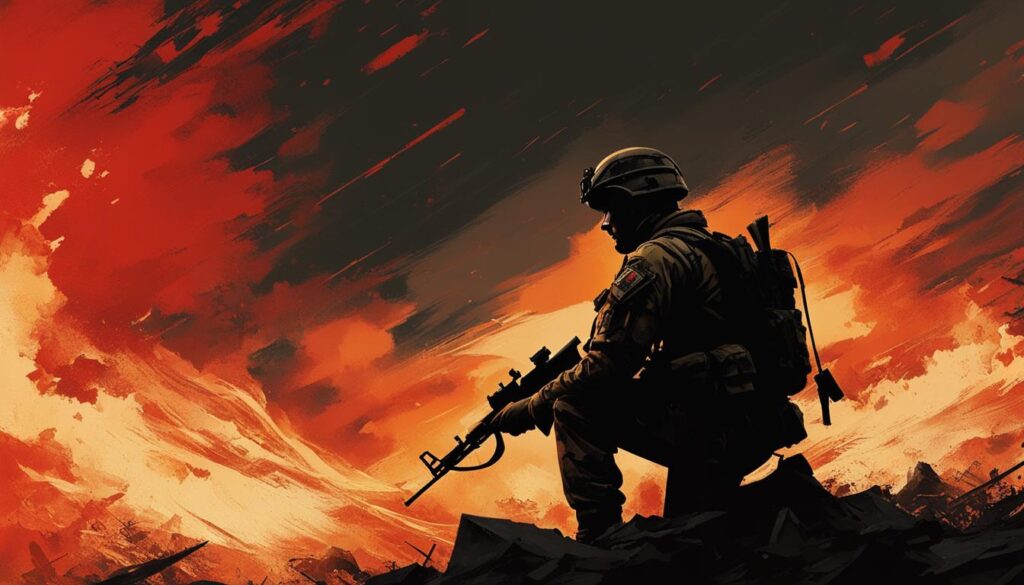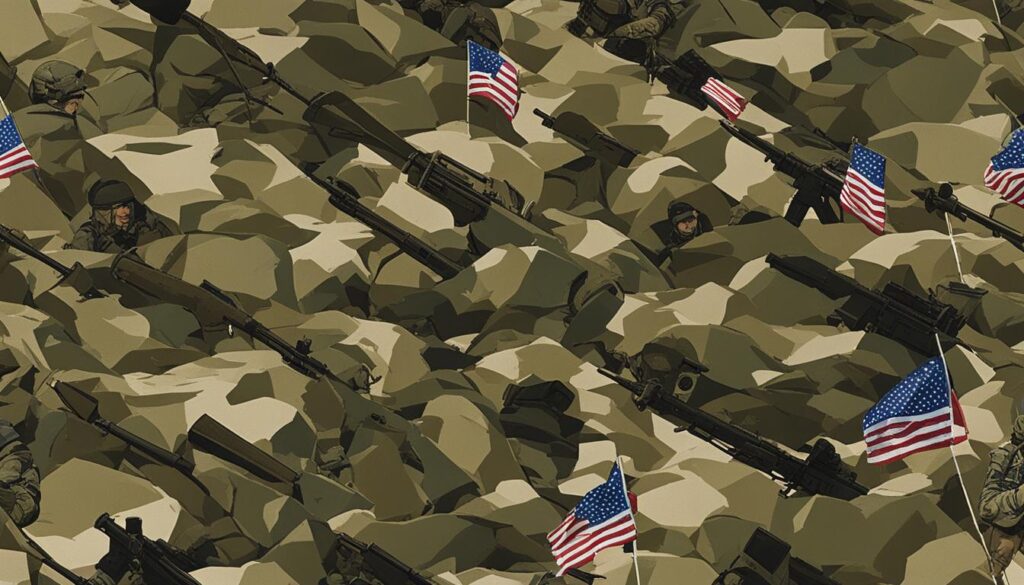If you’re in the mood for a gripping story that will keep you on the edge of your seat, then “I Am a Soldier, Too: The Jessica Lynch Story” is the perfect audiobook for you. Narrated by Rick Bragg, this book tells the harrowing story of Jessica Lynch, a brave soldier who overcame incredible challenges during her military service.
Throughout this review, we’ll delve into the details of the audiobook, exploring the life of Jessica Lynch before, during, and after her military service. We’ll also take a closer look at Rick Bragg’s narrative style and how it enhances the overall listening experience. Whether you’re a military history enthusiast or simply looking for an inspiring story, “I Am a Soldier, Too” is a must-read.
So, sit back, relax, and let’s dive into the incredible story of Jessica Lynch.
Introduction to “I Am a Soldier, Too”
Written by Pulitzer Prize winner Rick Bragg, “I Am a Soldier, Too” is an audiobook that chronicles the story of Private First Class Jessica Lynch. Through a captivating narrative style, Bragg shares Lynch’s harrowing experiences as a soldier during the Iraq War and her subsequent capture by enemy forces.
The audiobook summary provides an insightful overview of the events leading up to and following Lynch’s capture. With Bragg’s narration, listeners are transported to the heart of the action as they follow Lynch’s journey of resilience and survival.
Rick Bragg, a renowned journalist and author, brings his unique storytelling ability to the fore as he narrates the audiobook. His approach to storytelling conveys the immense hardship and unwavering courage that Lynch displayed during her ordeal, creating an immersive experience for the listener.
Through its compelling content, “I Am a Soldier, Too” sheds light on the impact that war has on soldiers and their families. Additionally, it highlights the bravery and sacrifice of those who serve in the military.
The image above showcases Rick Bragg, the author and narrator of “I Am a Soldier, Too.” Bragg’s excellent narration and storytelling skills make the audiobook a must-listen for anyone interested in military history or inspiring true stories of courage and resilience.
The Life of Jessica Lynch
Jessica Lynch was born on April 26, 1983, in Palestine, West Virginia. She grew up in a small town with a population of less than 400 people. Her parents, Greg and Deadra, had struggled with financial difficulties, and her father had to work various jobs to sustain the family. Despite the challenges, Lynch was a determined and hardworking student who focused on her studies and excelled academically.
As a child, Lynch loved to play sports and was particularly fond of basketball. However, her physical abilities were hindered by a condition known as lumbar scoliosis, which caused her spinal cord to curve in the lower back. The condition required surgery, and Lynch had to wear a brace for several months to support her back.
During her high school years, Lynch’s determination to succeed remained unwavering. She participated in various extracurricular activities such as choir and Future Farmers of America and was determined to become the first member of her family to attend college.
Despite her aspirations, Lynch was unsure of her career path after graduating high school. She was working as a clerk at a local grocery store when the September 11 attacks occurred. Inspired by the events, Lynch decided to join the military in 2001 and enlisted in the Army.
Table: Milestones in the Life of Jessica Lynch
| Year | Event |
|---|---|
| 1983 | Born in Palestine, West Virginia |
| 1999 | Graduated from high school |
| 2001 | Enlisted in the Army |
| 2003 | Captured in Iraq War |
| 2007 | Honorably discharged from the Army |
Lynch’s decision to join the military marked the beginning of a new chapter in her life. Despite facing challenges and adversity, she honored her commitment and made a significant impact through her service.
Joining the Military
After high school, Jessica Lynch worked at a local convenience store and as a secretary before seeking out a more fulfilling career path. The desire to serve her country and the influence of family members who had served in the military led her to enlist in the U.S. Army in 2001. At the age of 18, she left her hometown of Palestine, West Virginia to begin basic training at Fort Jackson, South Carolina.
During her training, Lynch excelled in marksmanship and physical fitness. Her training officers assessed her as a strong and capable soldier, and she demonstrated an unwavering commitment to becoming the best soldier she could be. Despite the challenges of adapting to military life, Lynch felt at home in the military and was determined to make a positive impact.
The decision to enlist in the military was not an easy one, but for Lynch, it was the right choice. As she later recalled, “For me, this was something that I wanted to do my whole life, and now I had the opportunity to do it. So, I was going to go all the way with it.”
The experiences that shaped her as a soldier
| Experiences | Impact on Jessica Lynch |
|---|---|
| Basic Training | Lynch loved the physical and mental challenges of military training, and quickly adapted to the regimented lifestyle of the military. |
| Unit Selection | Lynch was assigned to the Army’s 507th Maintenance Company in Fort Bliss, Texas, where she worked as a supply clerk. She formed strong bonds with her fellow soldiers, and grew into her role as a key member of the team. |
| Deployment to Kuwait | Lynch’s deployment to Kuwait in support of Operation Iraqi Freedom exposed her to the realities of war and the dangers of combat. She and her fellow soldiers knew that their mission was risky, but remained committed to their duty. |
Jessica Lynch’s experiences as a soldier would shape her life and the course of history. Her bravery and commitment to serving her country would be tested in ways she could never have imagined.
Deployment and Capture
As an Army supply clerk, Private First Class Jessica Lynch had no idea what was waiting for her in Iraq. In March 2003, she was deployed to the warzone, where she found herself amidst a fight for her life.
On March 23, 2003, Lynch’s convoy was ambushed by Iraqi forces, leading to a brutal battle. Lynch’s comrades were either killed or captured, leaving Lynch severely injured and alone. She was captured by the enemy and taken to a hospital in Nasiriyah.
| Fact: | The Iraq War began on March 20, 2003, when the United States, alongside the United Kingdom and other allies, invaded Iraq. |
|---|---|
| Fact: | By May 1, 2003, President George W. Bush declared that major combat operations in Iraq had ended. |
The shocking news of Lynch’s capture quickly spread, leading to a widespread search for her rescue. The U.S. military launched a daring rescue mission, known as Operation Iraqi Freedom, which was successful in rescuing Lynch on April 1, 2003.
The circumstances surrounding Lynch’s capture have been a subject of debate and controversy, with conflicting reports about the events that took place. Nevertheless, Lynch’s courage and resilience in the face of danger have inspired many.
The Ordeal of Captivity
During her time in captivity, Jessica Lynch experienced unimaginable horrors. Separated from her comrades and confined to a small room, she endured physical and emotional trauma.
She was mistreated, malnourished, and subjected to mental abuse. Despite her suffering, Jessica never gave up hope and relied on her training to survive.
Overcoming the challenges of captivity required immense courage and resourcefulness. Jessica had to find ways to stay strong, mentally and physically, knowing that her life was in danger.
The emotional trauma caused by her ordeal persisted for years after her rescue. She struggled to come to terms with her experiences and battled with depression.
| Challenges faced in captivity | How Jessica overcame them |
|---|---|
| Malnourishment | Jessica rationed her food, drank small amounts of water, and tried to stay active to preserve her strength. |
| Mental abuse | Jessica mentally prepared herself, focused on the future and kept a positive outlook despite her captors’ tactics. |
| Physical abuse | Jessica tried to stay fit by exercising in her small room whenever possible, using her own body weight for resistance. |
Jessica’s experiences in captivity were a testament to her bravery and resilience. They serve as a reminder of the sacrifices made by soldiers in the line of duty and the emotional toll of war.
The Rescue Mission
On March 23, 2003, U.S. Army Private First Class Jessica Lynch was taken prisoner by Iraqi forces after her convoy was ambushed. The rescue mission to retrieve Lynch from enemy hands was a daring operation that involved a team of U.S. Special Forces soldiers.
The operation, dubbed “Operation Iraqi Freedom,” was undertaken to free Lynch and other U.S. prisoners of war. The mission took place on April 1, 2003, in the city of Nasiriyah. It involved a nighttime helicopter insertion of the Special Forces team, who made their way to the hospital where Lynch was being held.
The rescue mission was not without risk – the team encountered Iraqi troops along the way and engaged in a firefight. Despite the danger, the Special Forces team successfully retrieved Lynch and brought her to safety. The operation was a resounding success and helped to boost morale among U.S. troops.
The Logistics of the Rescue Mission
The rescue mission to retrieve Jessica Lynch involved a complex operation that required detailed planning and coordination. The team of Special Forces soldiers responsible for the operation included Army Rangers and Delta Force operatives.
| Operation Details | Information |
|---|---|
| Operation Name | Operation Iraqi Freedom |
| Number of Soldiers Involved | Approximately 30 |
| Location of Rescue | Nasiriyah, Iraq |
| Hospital | Saddam Hospital in Nasiriyah |
| Helicopters Used | Three Black Hawk helicopters |
| Duration of Mission | Approximately an hour |
| Casualties | Eleven Iraqi soldiers killed, five captured, and seven U.S. soldiers wounded |
The logistics of the operation included coordinating the deployment of helicopters, providing cover fire while the Special Forces team entered the hospital, and using tactical maneuvers to extract Lynch from the building. The operation required detailed planning, coordination, and execution to minimize risk and ensure the rescue mission’s success.
The rescue of Jessica Lynch was a defining moment of the Iraq War and highlighted the bravery and skill of U.S. military personnel.
Media Coverage and Controversy
The story of Jessica Lynch captivated the media and the public, with conflicting reports and controversy following her rescue mission. The initial media portrayal depicted Lynch as a brave soldier who heroically fought back against her captors, despite being injured in battle. However, as more information emerged, questions were raised about the accuracy of the reports and the role of the military in shaping the narrative.
The controversy surrounding Lynch’s story highlights the impact of media portrayal on public perception and the importance of fact-checking and accurate reporting.
Comparing Initial Reports and Facts
| Initial Reports | Actual Facts |
|---|---|
| Lynch heroically fought back against her captors. | Lynch’s weapon jammed, and she sustained injuries when her vehicle crashed. |
| Lynch was captured after being ambushed by Iraqi soldiers. | Lynch’s unit took a wrong turn and was ambushed by Iraqi forces. |
| The rescue mission involved a dramatic firefight. | The rescue mission was conducted without resistance from enemy forces. |
The initial reports depicted a narrative of heroism and danger, whereas the actual facts presented a more nuanced and complicated account. This highlights the role of media portrayal in shaping public perception and the importance of fact-checking and accuracy in reporting.
Jessica Lynch’s Aftermath
After her rescue, Jessica Lynch faced a long journey of recovery and rehabilitation. She had suffered physical injuries, including a broken leg, an arm, and a back, as well as emotional trauma from her ordeal.
Lynch underwent several surgeries to repair the damage done to her body and received treatment for her psychological scars. She received support from her family, the military, and other members of the community who admired her bravery and resilience.
Despite her injuries, Lynch remained determined to rebuild her life. She enrolled in college and completed a degree in education, becoming a teacher. She also became a motivational speaker, sharing her story with others and inspiring them to overcome adversity.
Today, Lynch continues to live a fulfilling post-war life, working as a teacher and devoting time to her family and community.
Rick Bragg’s Narrative Style
In “I Am a Soldier, Too,” Rick Bragg’s narration adds a new dimension to the already gripping story of Jessica Lynch. Bragg’s approach to storytelling immerses the listener into Lynch’s experiences and emotions, making it a poignant and unforgettable experience. His narration style is rich in emotion, bringing out the depth of character in each individual in the story, making it an engaging listen.
Bragg’s use of vivid imagery and metaphors makes the story feel like it is unfolding right in front of the listener. The audiobook remains faithful to the book’s original tone, honoring Lynch’s bravery and sacrifices, while making it relatable to the audience. His narration conveys a sense of urgency, particularly during tense moments such as Jessica Lynch’s capture, making it a riveting and emotional listen.
Through Bragg’s storytelling, listeners gain an even greater appreciation for Jessica Lynch’s bravery, resilience, and sacrifices. Overall, Rick Bragg’s narrative style adds an exceptional component to “I Am a Soldier, Too,” elevating the already powerful story to even greater heights, making it a must-listen for audiobook enthusiasts.

Critical Reception
The audiobook “I Am a Soldier, Too” has received mixed reviews since its release. Literary critics have praised Rick Bragg’s narration for capturing the essence of Jessica Lynch’s story and bringing it to life for listeners. However, some have criticized the audiobook for lacking depth and nuance and simplifying complex issues related to war and PTSD.
Despite the mixed critical reception, the audiobook has resonated with the general public, particularly military families and veterans. Many have praised Jessica Lynch’s bravery and resilience and found her story to be cathartic and empowering. Others have criticized the media’s initial portrayal of Lynch and appreciate the audiobook’s efforts to set the record straight.
Overall, the critical reception of “I Am a Soldier, Too” reflects the complexity of Jessica Lynch’s story and the challenges of portraying it accurately. Despite its shortcomings, the audiobook has undoubtedly left a lasting impact on its listeners and shed light on the sacrifices made by those who serve in the military.
Key Takeaways
After listening to “I Am a Soldier, Too” by Rick Bragg, several key themes and messages are evident. Firstly, the book showcases the bravery and resilience of soldiers like Jessica Lynch, who risk their lives in the line of duty. Additionally, the consequences of war are explored, highlighting the emotional trauma and physical injuries suffered by soldiers long after their return home.
The book also raises important questions about the accuracy of media portrayal and public perception of war heroes. Through Jessica Lynch’s story, listeners can reflect on the impact of sensationalized news reports and how they can ultimately shape public opinion.
Overall, “I Am a Soldier, Too” is a thought-provoking and impactful audiobook that sheds light on the experiences of soldiers and the significance of their sacrifices.
Key Themes and Messages in “I Am a Soldier, Too”
| Themes and Messages |
|---|
| Bravery and Resilience of soldiers |
| Consequences of War |
| Media portrayal and public perception |
Recommended Audience
“I Am a Soldier, Too” is a must-listen for audiobook enthusiasts who enjoy compelling real-life stories. Anyone interested in the military, particularly those who want to understand the personal experiences of soldiers, will find this audiobook engaging.
Furthermore, individuals interested in biographies and memoirs will enjoy the detailed account of Jessica Lynch’s life before, during, and after her military service. This audiobook would be particularly relevant for students studying military history or anyone seeking to broaden their knowledge on the topic.

The emotional intensity of the story makes “I Am a Soldier, Too” more appropriate for mature audiences. Because of the explicit accounts of war, it is not recommended for younger listeners.
Conclusion
Overall, “I Am a Soldier, Too” is a gripping audiobook that offers a unique perspective on the experiences of soldiers during times of war. Through the story of Jessica Lynch, listeners gain insights into the bravery and resilience of those who serve in the military, as well as the physical and emotional toll that war can take.
Rick Bragg’s narration style enhances the overall experience of the audiobook, effectively conveying the urgency and intensity of the events that take place. Additionally, “I Am a Soldier, Too” raises important questions about the media’s portrayal of soldiers and the impact it can have on public perception and understanding.
For those who enjoy audiobooks that offer a thought-provoking and emotional journey, “I Am a Soldier, Too” is a highly recommended choice. It is suitable for anyone interested in the military, war stories, and memoirs.
Final Remarks: “I Am a Soldier, Too” is a testament to the bravery and resilience of soldiers, as well as the critical role they play in protecting our freedoms and way of life. It is a powerful reminder of the sacrifices made by those who serve and the importance of honoring their service.



